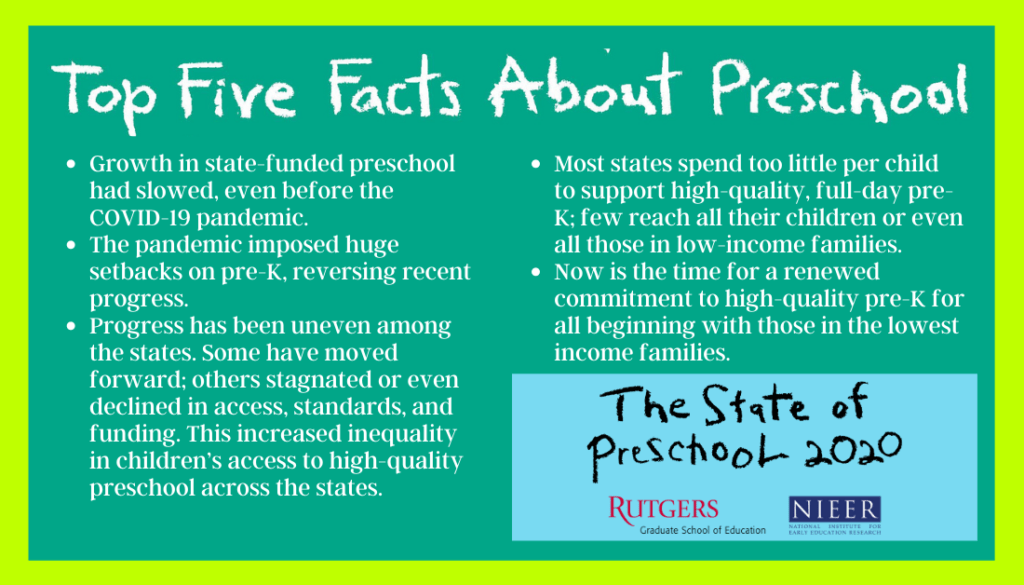FOR IMMEDIATE RELEASE
MEDIA CONTACT
Jennifer Gioia
919-578-1593
jenniferg@childcareservices.org
Too Many North Carolina Children Lack Access to High-Quality Pre-K; Pandemic Made it Worse
Federal/State Partnership Needed to Better Serve Young Children and their Families.
Chapel Hill, N.C., April 19, 2021: The COVID-19 pandemic set back state preschool enrollment and funding across the country, according to the 2020 edition of The State of Preschool Yearbook by the National Institute for Early Education Research (NIEER) at the Rutgers Graduate School of Education.
Pre-pandemic, North Carolina saw an increase in enrollment and inflation-adjusted total spending, though spending per child declined. The state met 8 of 10 minimum standards for high-quality preschool education.
Now is the time for a renewed commitment to high-quality pre-K for all, beginning with those in the lowest income families. Statewide, the report found that:
- North Carolina enrolled 31,059 children, an increase of 1,550 from 2018-2019
- Total state funding was $166,326,635 (including TANF), an increase of $3,156,647 from 2018-2019 (inflation adjusted)
- State spending-per-child was $5,355 compared to $5,529 in 2018-2019 (inflation adjusted)
- North Carolina national rankings:
- 26 in access for 4-year-olds
- 20 in state spending per child
“Preschool programs support children’s early learning and development and well-being. They prepare children to succeed in school and reduce achievement gaps that emerge before kindergarten,” said CCSA President Marsha Basloe. “The COVID-19 pandemic has made access to high-quality preschool more challenging. We are optimistic that the demand for early childhood services will rebound this fall as public and community preschool programs reopen for in-person instruction and the health risks hopefully decline. North Carolina must be ready to meet this increased demand.”
“Funding and enrollment increases are going in the right direction, but North Carolina has a long way to go to increase spending to serve more children in high-quality programs that can support children’s development,” said Steven Barnett, Ph.D., NIEER’s founder and senior co-director.
The 2020 State of Preschool Yearbook is the only national report on state-funded preschool programs, tracking enrollment, spending and policies to support quality since 2002. This year’s report includes a special section on the impact of the COVID-19 pandemic on state-funded preschool programs.
Across the country, the survey reveals bipartisan support for preschool with both “red” and “blue” states among the nation’s leaders in high-quality pre-K. That offers hope that the nation can move ahead to expand access to high-quality pre-K more rapidly in the future. View North Carolina’s data and the full report.
The 2020 State of Preschool Yearbook was supported with funding from the Heising-Simons Foundation and the Bill and Melinda Gates Foundation. Cost modeling and funding analyses were supported with funding from the PNC Foundation. For more information and detailed state-by-state profiles on quality, access and funding, please visit www.nieer.org.
The National Institute for Early Education Research at the Rutgers Graduate School of Education, New Brunswick, N.J., supports early childhood education policy and practice through independent, objective research and the translation of research to policy and practice.
Child Care Services Association
Founded in 1974, the mission of Child Care Services Association (CCSA) is to lead efforts to strengthen accessible and affordable quality early care and education by providing supports for families, communities and the workforce. To that end, CCSA provides free child care referral services to families, financial assistance to low-income families seeking child care and professional development and technical assistance to child care programs. Through spoonFULL, CCSA also provides nutritious meals to children at child care centers, where they may eat 50-100 percent of their meals. Throughout North Carolina, educational scholarships from CCSA’s T.E.A.C.H. Early Childhood® Scholarship Program give child care professionals the means to obtain a debt-free education, while CCSA’s Child Care WAGE$® and Infant-Toddler Educator AWARD$ Plus® programs supplement their meager salary. CCSA also licenses T.E.A.C.H. and WAGE$ across the U.S. through the T.E.A.C.H. Early Childhood® National Center at CCSA and conducts early childhood systems and homelessness research and policy development statewide and nationally. For more information, visit www.childcareservices.org.
-end-



